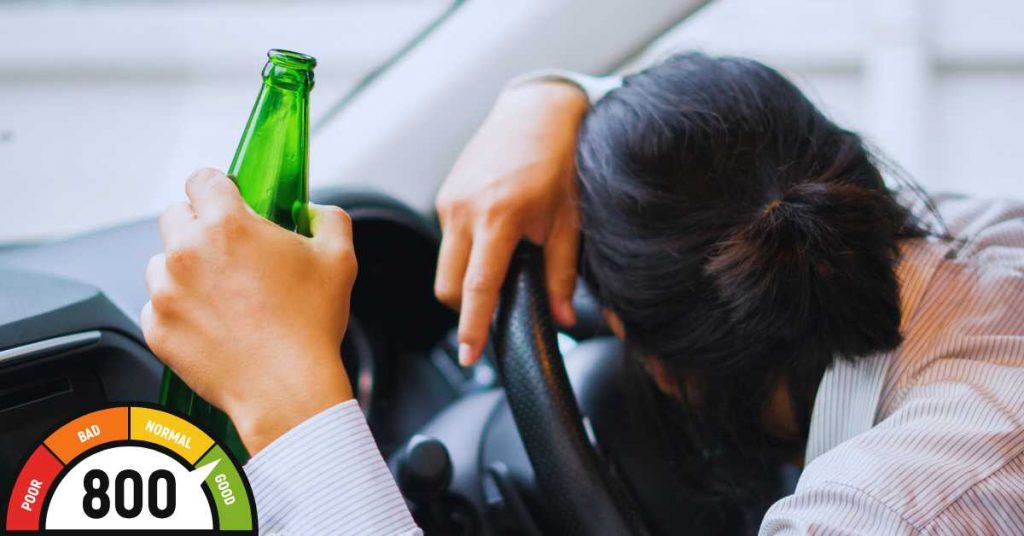Does DUI Affect Your Credit Score? The Hidden Effects

DUI and Credit Scores: Does DUI Affect Your Credit Score? Get insights into how a DUI offense can potentially damage your credit score.
Driving under the influence (DUI) is a severe offense with various consequences. While most people know the potential legal penalties and impact on their driving record, one question often arises is whether DUI affects their credit score. This article will explore the relationship between DUI and credit scores, understanding how this offense can influence your financial standing.

1. Introduction
DUI, also known as DWI (driving while intoxicated) or OUI (operating under the influence), refers to operating a motor vehicle while impaired by alcohol or drugs. It is a criminal offense that carries significant legal repercussions. However, its impact extends beyond the legal system, potentially affecting various aspects of an individual's life, including their creditworthiness.
2. Understanding DUI
Before delving into the connection between DUI and credit scores, it's essential to grasp the implications of a DUI offense. When someone is charged with a DUI, they may face fines, license suspension, mandatory alcohol education programs, and even imprisonment, depending on the severity of the offense and the jurisdiction. These penalties serve as a deterrent, emphasizing the seriousness of impaired driving.
3. The Impact of DUI on Credit Score
3.1. Credit Reports and DUI
To comprehend how DUI can impact your credit score, it's essential to understand the role of credit reports. Credit reports are detailed records of an individual's credit history and financial behavior maintained by credit bureaus. These reports contain information such as credit accounts, payment history, and public records, including criminal offenses.
3.2. Negative Effects on Credit Score
While a DUI offense may not directly affect your credit score, its consequences can indirectly negatively impact you. For instance, if your DUI results in financial difficulties, such as fines or legal fees, you may struggle to meet your financial obligations. Missed payments, defaults, or collections can significantly harm your credit score.
3.3. Long-Term Consequences
Furthermore, a DUI offense can have long-term consequences that indirectly affect your creditworthiness. For instance, if your driver's license is suspended or revoked due to a DUI, it may limit your ability to commute to work or fulfill other responsibilities, potentially leading to employment instability or financial hardship.
4. Factors That Influence the Impact
The impact of DUI on your credit score can vary depending on several factors. Understanding these factors can provide insights into the severity of the consequences and how to navigate them effectively.
4.1. Severity of DUI Offense
The severity of the DUI offense plays a crucial role in determining its impact on your credit score. Multiple DUI convictions, involvement in accidents, or causing bodily harm may exacerbate the negative consequences and reflect more negatively on your creditworthiness.
4.2. Financial Implications of DUI
The financial implications resulting from a DUI can significantly impact your credit score. Fines, legal fees, increased insurance premiums, and the potential loss of employment can strain your financial stability, making it challenging to manage your debts and maintain a good credit standing.
In addition to credit score implications, a DUI offense may lead to other credit-related consequences. For instance, some auto insurers may either increase premiums or refuse coverage altogether after a DUI conviction. This can make it more difficult and expensive to obtain auto insurance in the future.

Examples of How a DUI Conviction Can Indirectly Affect a Person's Credit Score
a. Fines and legal fees:
If an individual cannot pay their DUI fines and legal fees on time, it can lead to a collection account being reported on their credit report. This can lower their credit score, making it harder for them to obtain credit or loans in the future.
If an individual is convicted of DUI, their insurance premium may increase significantly. If they cannot afford the higher premium, they may let their insurance lapse, leading to a collection account being reported on their credit report.
c. Loss of income:
A DUI conviction can lead to a loss of revenue, either because the individual loses their job or cannot work while serving a jail sentence. This can make it difficult for them to pay their bills on time, negatively impacting their credit score. However, read this free Lawyer’s Advice, If you want a job with A DUI.
d. Employment Consequences:
Some employers conduct background checks on potential employees, and a DUI conviction on your record may make it easier for you to find a job. This may lead to a lack of income and financial difficulties, affecting your credit score.
e. Higher Interest Rate:
A DUI conviction can also lead to higher interest rates on loans and credit cards, making it more expensive to borrow money and affecting your credit score.
It's essential to remember that these are examples, and the actual impact on an individual's credit score will depend on their specific circumstances and the severity of the DUI conviction. It's also important to remember that a DUI is a serious crime that carries severe penalties and can have far-reaching consequences.
5. Steps to Minimize the Impact
While a DUI offense can negatively impact your credit score, you can take steps to mitigate its impact and improve your credit health.
5.1. Seek Legal Guidance
If you are facing a DUI charge, seeking legal guidance from an experienced attorney is crucial. They can provide insights into the legal process, help you understand your options, and potentially negotiate a plea agreement or alternative sentencing that may minimize the negative impact on your credit and overall financial well-being.
5.2. Monitor Credit Reports
Regularly monitoring your credit reports is essential, particularly after a DUI offense. By reviewing your reports, you can identify any inaccuracies or discrepancies that may arise due to the DUI. Promptly addressing these issues with the credit bureaus can prevent further harm to your credit score.
5.3. Improve Credit Health
Taking proactive steps to improve your credit health can mitigate the impact of a DUI on your credit score. This includes making timely payments, reducing outstanding debts, and using credit responsibly. Building a positive credit history over time can help offset the adverse effects of a DUI.
Read Also: Life after DUI Tips: Key Steps for Reclaiming Your Future
6. Conclusion
In conclusion, while a DUI offense may not directly impact your credit score, its consequences can indirectly influence your creditworthiness. Financial difficulties, license suspensions, and other long-term effects can lead to missed payments and defaults, negatively affecting your credit health. However, by seeking legal guidance, monitoring credit reports, and improving your credit, you can minimize the impact of a DUI on your credit score and work towards rebuilding your financial stability.
7. FAQs
Q: Can DUI be removed from a credit report?
Ans: A DUI offense cannot be removed from a credit report. Credit reports reflect accurate and complete information about an individual's credit history, including criminal offenses.
Q: How long does DUI stay on your credit report?
Ans: A DUI offense typically remains on your credit report for several years. In most cases, it can be present for up to seven years, depending on the credit reporting agency's policies.
Q: Will a DUI affect my ability to get a loan?
Ans: Yes, a DUI offense can impact your ability to get a loan. Before approving a loan, lenders often consider a person's creditworthiness and evaluate any red flags or negative factors, including DUI offenses.
Q: Can I rebuild my credit after a DUI?
Ans: It is possible to rebuild your credit after a DUI. You can gradually improve your credit score by focusing on responsible financial practices, such as making timely payments, reducing debts, and managing credit responsibly.
Q: Should I inform my creditors about my DUI?
Ans: While informing your creditors directly about your DUI is unnecessary, being proactive in managing your financial obligations is crucial. Paying bills on time and maintaining open communication with creditors can mitigate potential negative impacts on your credit standing.
So, after reading this article, tell me: Does DUI Affect Your Credit Score? I think It is easier to answer than before. Please comment below.

Recommendation